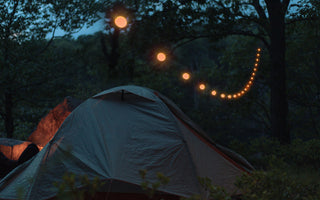Before you jump into #VanLife, take it for a test drive.
When you open up Instagram, it seems everyone these days is “living the #VanLife.” Van life seems like a very aspirational lifestyle, and while it is, it’s also much more. There’s always a messier and more complex reality outside of the perfectly portrayed image we have in our mind.
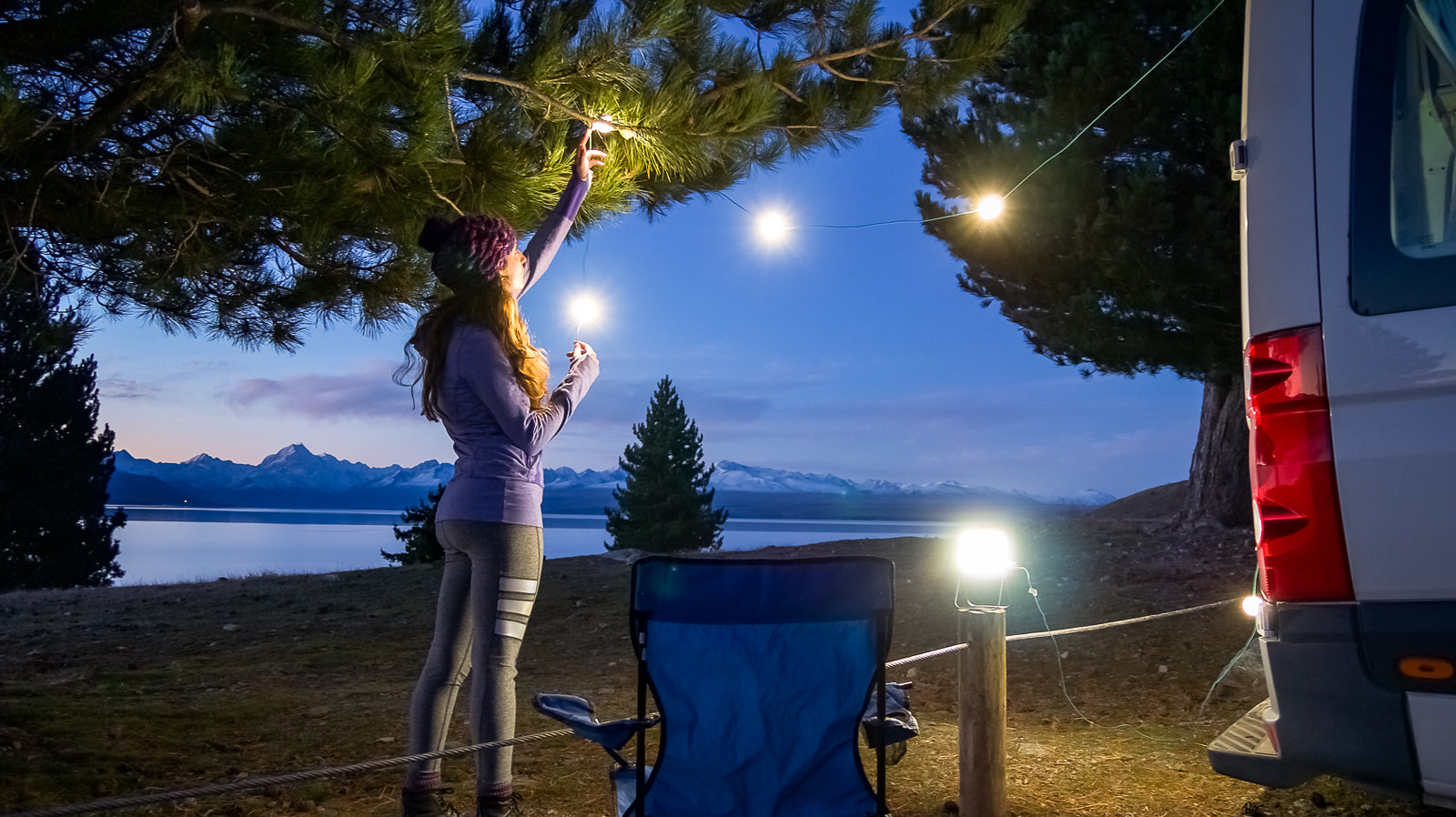
So, before you quit your job, sell your house, and buy a van, I’ve got a guide to find out if van life is the lifestyle for you. Take it from someone who quit her job, sold her stuff, and backpacked around the world for a year. Since we’ve been back home, we’ve been toying with the idea of living the van life, so we gave it a “test drive” in New Zealand. In order to determine if van life is right for you, here are a few questions to ask yourself:
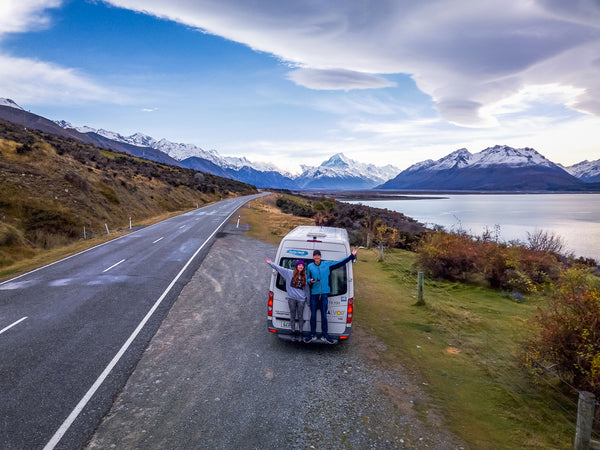
Do you like driving? To get to that uninhabited campsite, you’re going to have to drive there. This one may seem blatantly obvious but whether you’re the driver or the passenger, it’s important that you at least somewhat like driving. If you’re someone who gets car sick, van life might literally make you ill. If you’re a road warrior, van life might be your best life.
Are you comfortable in close quarters? It’s more than likely that living in a van will be downsizing from your current living situation. You will be living in close quarters and if you are living with a partner your personal space will be significantly reduced. Yes, nature is at your fingertips, but when bad weather hits, you’ll be confined to your van. If you are claustrophobic, living in a van might be uncomfortable. If you feel a sense of comfort in small spaces, you will feel right at home and cozy in a van.
Can you embrace a little bit of grime? Cold rinses, sponge baths, extra deodorant and dry shampoo will become your secret weapons. Even if you are lucky enough to have a shower in your van, you likely won’t have capability for many long hot showers. Yes, you can find the luxury of a nice shower at the occasional campground or at a friend’s house along the road, but that won’t be the norm. If you’re someone who can’t survive without a daily hot shower you might not ever feel clean in your camper van. If you don’t mind a little dirt under your fingernails, you’ll fare just fine.
Are you flexible and open to change? Life on the road can be unpredictable and full of surprises (both good and bad). You have to be able to adapt when (not if, but when) things don’t go according to plan or be okay without having a plan. If you need a strict routine to function or are opposed to change, living in a van might not be your cup of tea. If you crave new experiences and are someone who can go with the flow, you will enjoy the unpredictability of van life.
If you answered yes more than no to these questions and van life still sounds appealing, you’re ready for a test drive! Before you hit the road, take a look through our list of learnings from our two week test drive in New Zealand.
8 Things No One Tells You About #VanLife
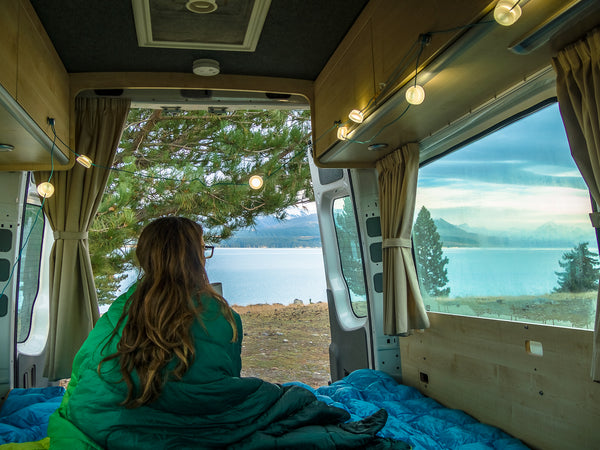
1. You can’t just park anywhere you want.
Before taking our test drive, I had envisioned we could pull over on the side of the road where ever we pleased to park for the night. That was not the case in New Zealand and will not be in most countries. You need to be mindful of where you park (especially overnight) as many places are illegal and you could end up with expensive tickets. Do your research to see where you can park or if you are renting a van, ask the van company for any resources they have (they will often give you maps and pamphlets or have an app). New Zealand had new restrictions placed in 2018 that limited free campervan parking and we had to pay for campsites more often than we anticipated.
2. Batten down the hatches before hitting the road.
Everything in the van needs to be secured before you drive off. We found this out as soon as we pulled out of the first parking lot and our bags went flying! Make sure all cabinets, drawers, and storage spaces are closed and locked every single time you drive off. You’ll get used to it eventually.
3. Getting around takes longer than you'd expect.
When we first hit the road, we grossly underestimated travel times from our maps apps. We failed to account for the slower speed we would be traveling in our van, or the times we would be stuck behind even slower vehicles, especially up mountain passes or on winding two-lane roads that occasionally narrowed to one lane. New Zealand also seemed to have its share of single lane bridges. We came across signs for several viewpoints that weren't on our original radar, but decided to stop along the way and never regretted the short stops or detours. Account for extra travel time in your van, especially in the beginning when you are adjusting to driving your van and local roads. Instead of trying to cram so many stops into our day, we decided to prioritize destinations and enjoy more time at fewer stops.
4. Planning every moment of your day is a recipe for disappointment.
Things will never go exactly as planned and the more room you leave for flexibility and spontaneity the more you will set yourself up for success. It is great to have goals and checkpoints in mind, but be unattached to the outcomes. You'll learn a lot along the way and find new destinations from interactions with locals and other travelers that you wouldn't have previously had on your radar.
5. Check the seasonal weather forecast of your #vanlife destination.
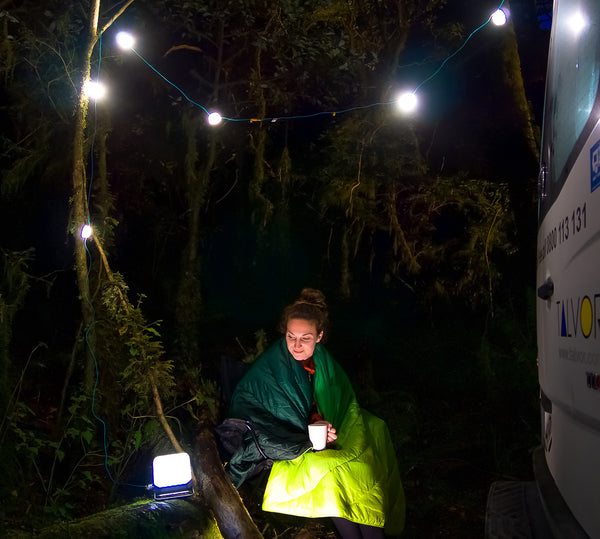
To avoid the harsh conditions of winter or summer, we recommend taking your test drive during fall or spring if possible. Depending on where you travel, fall and spring are typically lower tourist seasons, with fewer crowds and lower costs.
If you are traveling in winter, make sure you are comfortable driving in snow and have adequate equipment for icy conditions (chains and an ice scraper!). Look at the night time lows, since you will be sleeping inside your van it can get cold and you want to be comfortable. Our rental campervan had a propane heater that we were able to use to keep our van warm on cold nights (this would be necessary if traveling in the winter) and also an electric heater that we could use when we were parked at a paid campsite plugged into power. If you are traveling in hot summer temperatures, you can always open a van window or sleep outside, but an electric fan could help with comfort when your van is plugged into a power source at a campsite.
6. Get used to a new hygiene routine.
We were lucky to have a tiny bathroom with a toilet and shower in our van but even still showering in the van meant showering on top of the toilet where the water temperature was generally either scalding hot or freezing cold. We ended up finding campsites to shower at but not all campsite showers are created equal, some are comfortable and modern while others provide the bare minimum. If neither of these options are in the cards, prepare to use use a damp towel, extra deodorant, and dry shampoo between.
7. Tight quarters can be tough on relationships.
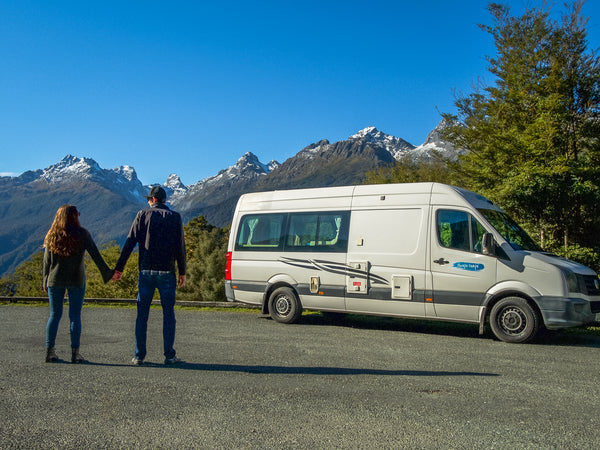
If you’re traveling with a significant other you’ll have little personal space in the van. Whatever relationship issues you already have won't magically disappear just because you moved into a van together, they will likely be amplified, so be prepared to work through them or find compromises.
Since we had previously backpacked around the world together for a year, Matt and I got pretty good at working together after a fight. Our go-to was to act as nothing was wrong and move on with our days and we unintentionally adopted this in our #vanlife test drive. While this worked on one hand, on the other hand this was harmful as there were times we would just pretend our problems didn't exist. This caused the same problems to keep coming up. What was most helpful was when we actually sat down without distractions and took time to talk them out and come to compromises.
It's important to verbalize issues with your partner instead of pushing them aside and letting them build into a big fight. When a fight does emerge, it is best to work through it and figure out ways to prevent the same fight from reoccurring. Be sure to apologize for any hurt feelings to move forward. Make sure to take some time apart, even if it's just for a few minutes every day to do something on your own that you enjoy and don't rely on your partner for 100% of your social interaction.
8. Find time to take care of yourself.
Just driving from one place to the next can put a lot of wear and tear on not only your body but also your mind. Make sure to carve out time to do things that make you happy and are good for your mental and physical well-being. Find out what you love most about #vanlife and add more of that to your day-to-day. Maybe it's waking up to catch a sunrise, drinking your morning coffee outside, pulling over for unexpected viewpoints, or sitting under the stars at night. Even if your test drive remains just that, a test drive and not a full on van lifestyle, you can incorporate these learnings about yourself into your life back at home.
After completing our test drive, we think that everyone should have the opportunity to experience the phenomenon of van life at least once in their lives. It will allow for an adventure you’ll never forget and it might just lead you to a life on the road as a full-time nomad. We came away from this trip learning a lot about ourselves and this nomadic lifestyle. We learned to embrace a slower pace, allow for unexpected stops (which became some of our favorite parts of the trip), enjoy life on the open and got closer to each other by navigating through any challenge we encountered along the way.
Must-Pack Checklist for a Smooth “Test Drive”
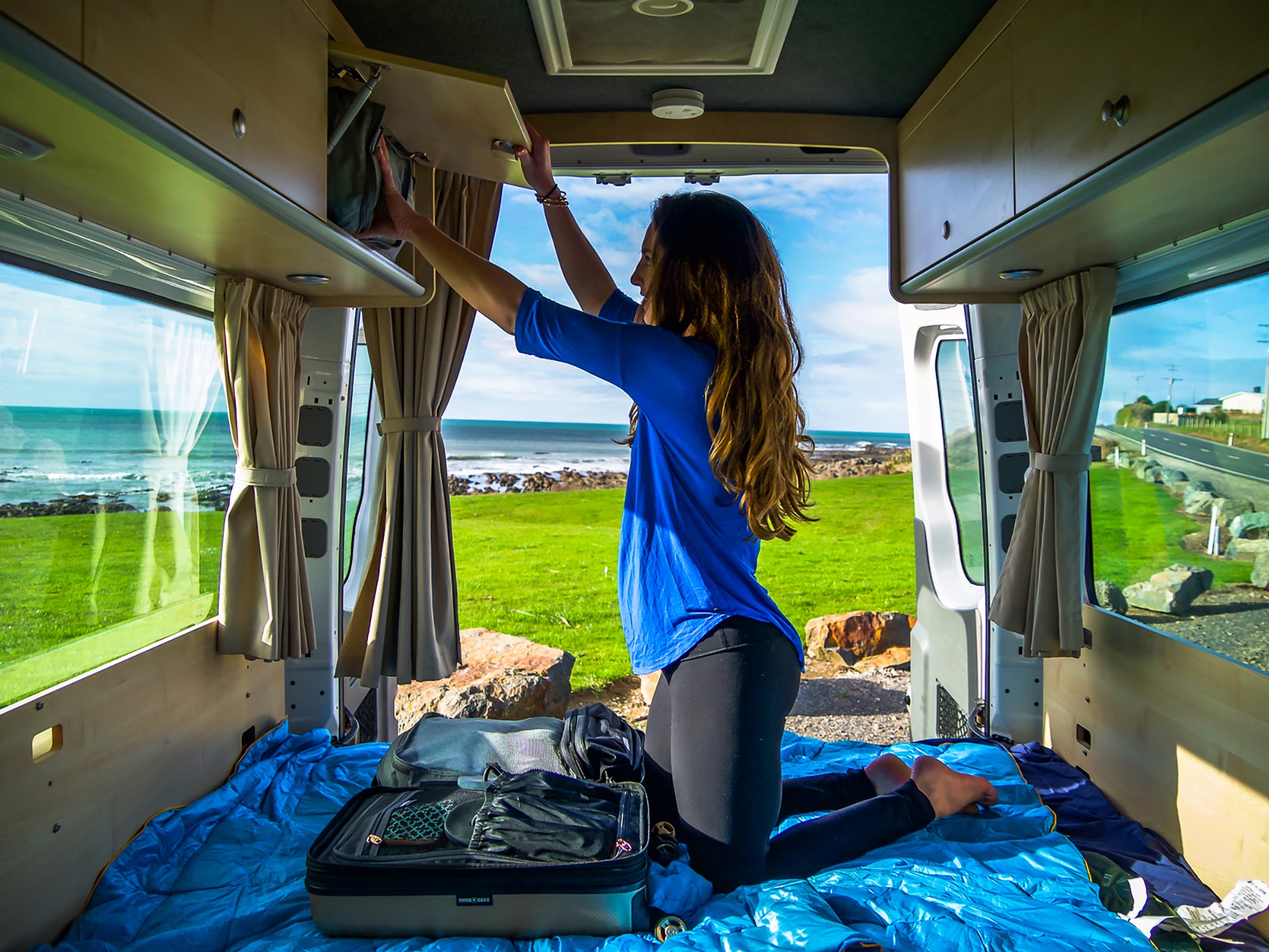
- Stay hydrated - A large refillable water bottle will be your best friend on the road. Fill it with clean natural water wherever accessible and purchase the biggest container of drinking water you can fit in your van. Use that to refill your water bottle when you don’t have other options. It is also good to have extra water in case of an emergency.
- Avoid “hanger” - Protein bars make a great quick snack or meal replacement on the road. Avoid being “hangry” (hungry + angry) and always have a some handy.
- Get organized - Packing cubes are perfect to store your clothes in and stay organized. You can put them directly in any storage units so you don’t have to feel like you are living out of a backpack and it will make you feel more at home in your van. Packing cubes will prevent your clothes from getting all jumbled together on long bumpy and winding roads. Select ones with a mesh top so you can easily see what is inside.
- Navigate efficiently - A car phone holder that can be attached to your windshield or clamped on the van’s vents will help you navigate hands-free. (This is perfect if you are traveling solo).
- Keep your gear charged. While your wheels are in motion, charge your gear with a car adapter power strip. When your van is powered off, the BioLite BaseLantern XL not only functions as a bright source of light, but also serves as a power hub with USB ports to charge your devices. The battery of the BaseLantern XL lasted significantly longer than any of our other basic portable phone chargers and this was while it was providing us light.
- Illuminate your space - Avoid sitting in the dark and make your van feel like home with BioLite SiteLight Minis. These string lights provide ample lighting, especially when plugged into the BaseLantern XL. The BioLite SunLight is perfect for task lighting and can run for up to 50 hours. Plus, it can be charged by the sun thanks to its solar panel so you won’t have to worry about it taking up valuable charger space. It illuminates in a wide range of colors, so pick your favorite color to match your mood.
- Protect yourself from the sun - Bring sunglasses with sun protection so you can comfortably keep your eyes on the road while driving! Don’t forget sunscreen and a hat for your outdoor adventures.
- Get cozy - A versatile outdoor/indoor blanket will keep you warm at night and can double as a picnic or beach blanket during the day.
- In case of emergency - Travel with a compact First Aid kit in case of an emergency. Ours has a variety band aids, antiseptic wipes, gauze, little scissors, and various medications.
- Bare necessities - Always pack toilet paper. Self-explanatory.
Looking for tips about how to make this lifestyle work for you without quitting your job? Take a look at our latest blog including advice from digital nomads on how they manage jobs while living on the road.
